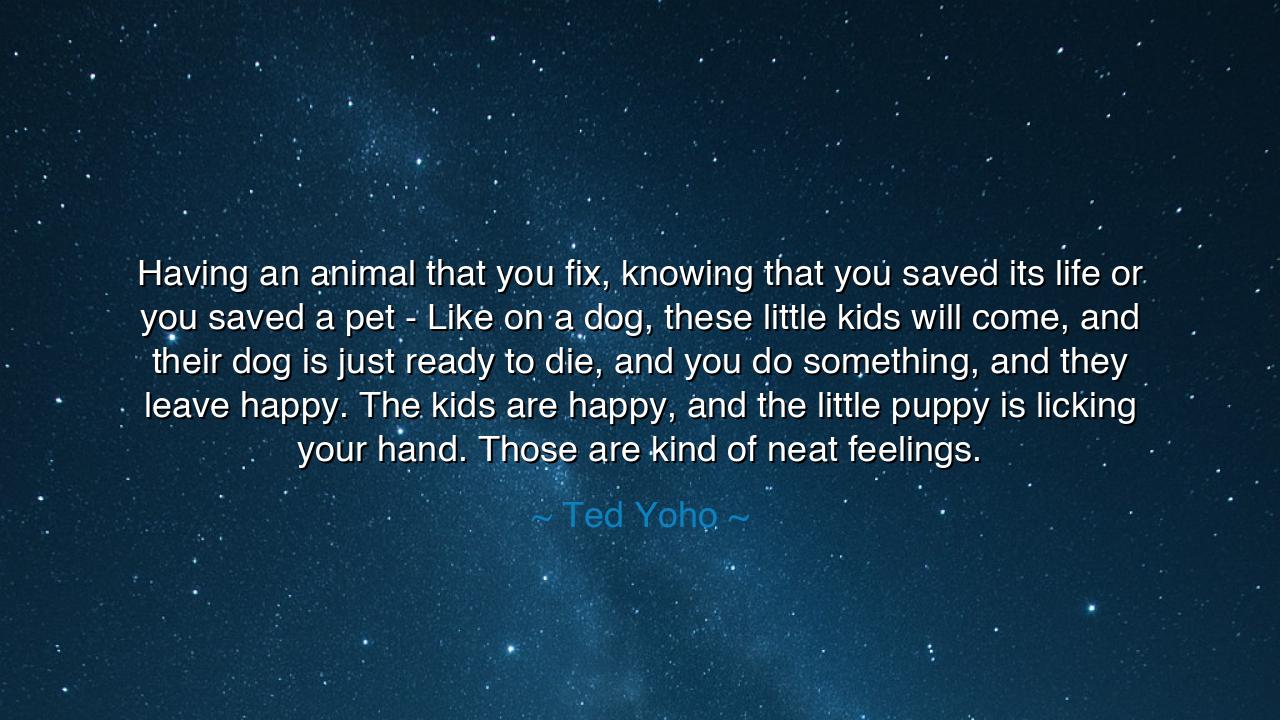
Having an animal that you fix, knowing that you saved its life
Having an animal that you fix, knowing that you saved its life or you saved a pet - Like on a dog, these little kids will come, and their dog is just ready to die, and you do something, and they leave happy. The kids are happy, and the little puppy is licking your hand. Those are kind of neat feelings.






Hear now the words of Ted Yoho, spoken with the humility of one who has touched both the fragility of life and the strength of compassion: “Having an animal that you fix, knowing that you saved its life or you saved a pet—like on a dog, these little kids will come, and their dog is just ready to die, and you do something, and they leave happy. The kids are happy, and the little puppy is licking your hand. Those are kind of neat feelings.” At first, these words may seem simple, the reflections of a healer of beasts. But listen closely, and you shall hear the echoes of an eternal truth: that in the act of saving another, we also save ourselves.
For what greater gift can one give than the gift of life? The physician of animals does not labor for gold alone, but for the joy that springs when despair is turned to hope. The child who watches their beloved dog fall into weakness knows the heavy weight of grief, for in that creature rests innocence, loyalty, and friendship. Yet when the healer’s hand restores the creature, the child’s sorrow is lifted, and their heart learns that love may yet triumph over death. This is no small act—it is the mending of bonds between human and beast, between despair and joy, between what is lost and what is found.
The ancients knew well the sacred duty of tending to the creatures entrusted to our care. In the chronicles of Alexander the Great, it is told that he had a faithful horse, Bucephalus, who carried him through many battles. When the steed was wounded and close to death, Alexander grieved deeply, for he knew the horse had been not merely an animal, but a companion in destiny. Had there been a healer who could restore that noble creature, the king would have offered treasures beyond measure. Thus we see that the act Yoho describes, though small in the eyes of some, is of the same grandeur as the saving of kingdoms, for it rescues loyalty, friendship, and trust.
In such a scene—the child weeping, the puppy weakened, the healer bending low—we find a heroism unsung. For is it not more powerful to rescue the small and voiceless than to conquer with armies? A kingdom is built upon stones and laws, but the heart of a child is built upon the love of small things. To preserve that bond is to guard the future itself, for a child who learns mercy today will practice justice tomorrow.
The feelings Yoho names—“neat feelings”—are but modest words, yet behind them roars the eternal fire of meaning. For what he describes is nothing less than the reward of compassion: that moment when the healer sees gratitude shining not only in the eyes of the creature saved, but also in the souls of those who loved it. The puppy licking the hand becomes a symbol of creation restored, of innocence returned, of the circle of trust renewed.
Therefore, the teaching is clear: do not measure your deeds by their grandeur in the eyes of the world. Even the saving of one small life, one creature that cannot speak, is a victory of light over shadow. To rescue is divine; to comfort, eternal. Whether you are a healer of beasts, a friend to the forgotten, or a guardian of the weak, your actions ripple through generations, shaping the hearts of those who witness them.
So let this be your lesson: act with compassion, even when the world does not watch. If you see suffering, do not turn away. If a creature cries, reach forth your hand. If a child weeps, be the one who brings them joy again. These are the small triumphs that forge the great destiny of humankind.
And the practical path is this: care for the vulnerable, whether they walk on two legs or four. Give water to the thirsty, tend to the wounded, protect the weak. In every act of mercy, you will find not only the saving of another’s life, but the saving of your own soul. For when the day ends, and you remember the hand that was licked, the tears that were dried, and the life that was spared, you will know that you have touched eternity.






AAdministratorAdministrator
Welcome, honored guests. Please leave a comment, we will respond soon